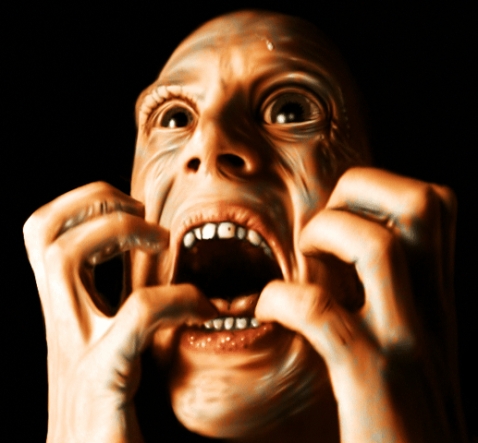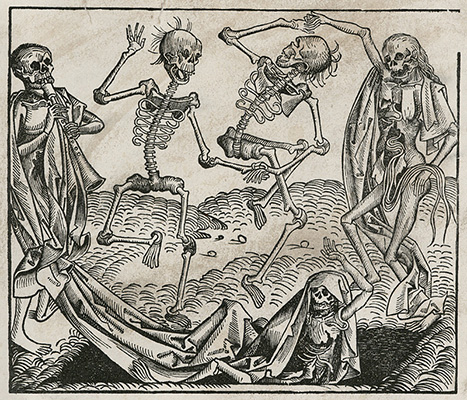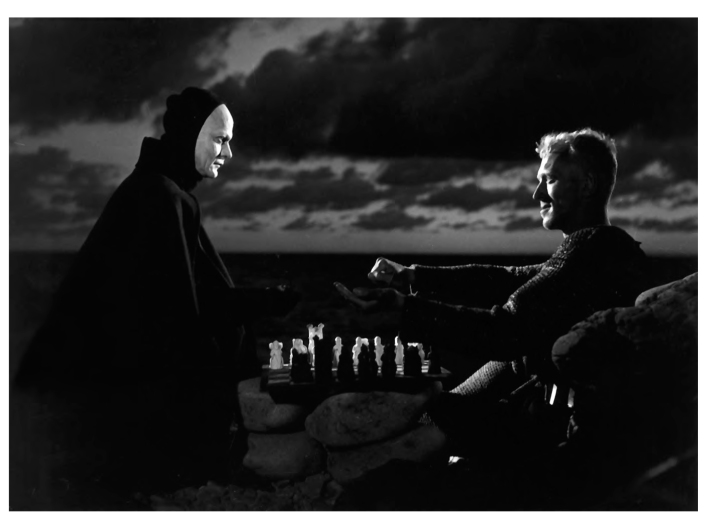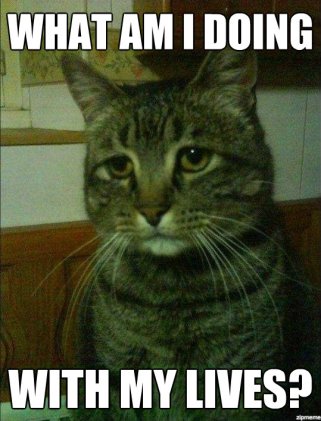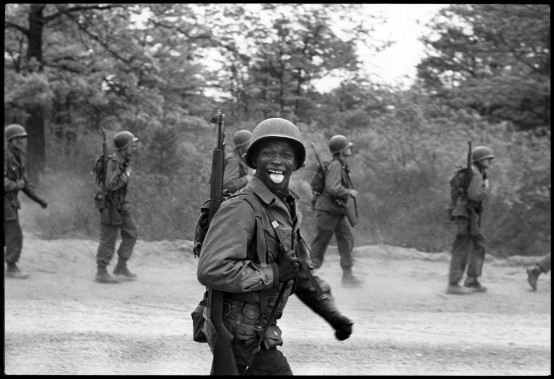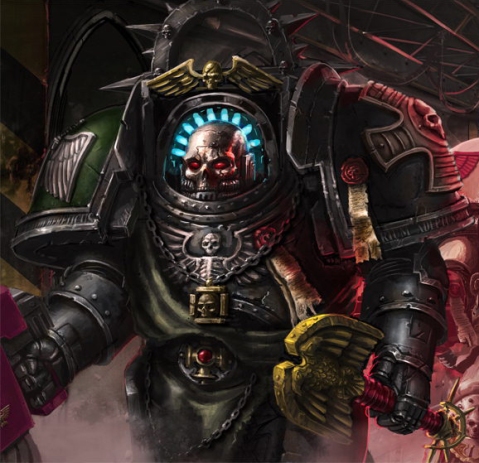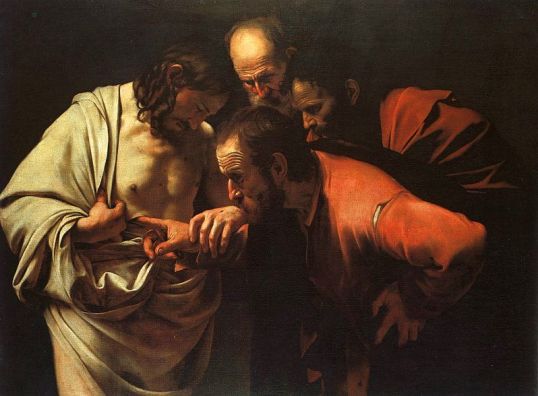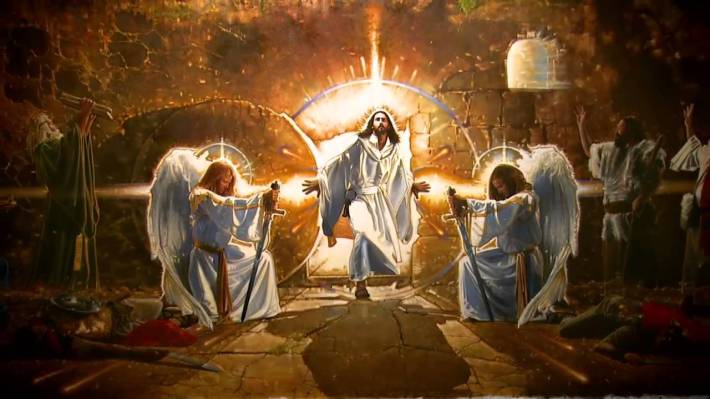By Jonah
Ok, so if you have been living under a rock and haven’t read part 1, go to the archive and give that a read. Seriously. Go to the kitchen, brew a coffee or boil or dunk slosh or whatever it is you do with tea, and read part 1. Part 2 begins kind of abruptly otherwise.
.
.
.
.
Ok, so you’re not gonna listen. *siiiiiiiiigh* That’s fine. I guess I was being kind of over dramatic. Anyway, here are the various ways Catholics approach death.
Acknowledgment
The Catholic can acknowledge the horror of death.
There seemed to be a movement that went on for a while which entailed not crying at someone’s funeral but dancing to celebrate their life. The Catholic takes this craze and tosses it down the well where it belongs.
Death, in the understanding of the Church, is but should not be. It takes all that was done in life and makes it superfluous. All our works, aims, goals, everything gets swallowed up in death. Every building we make will crash to the ground. Every life we save is merely an attempt to stave off the hand of the reaper. Life itself is never perfect, and no matter how many material goods you have they can’t save you from its sad, scary, cold and shaky end. You will have to part with your friends and family, either by your death or theirs.
And even if you decide to lead a good life and leave a good influence on others so that when you pass they are left with something nice to remember you by, they too will die one day and the memory of you will die with them. The whole universe is subject to entropy and so all the works of men, the good and the wicked, will be swept up in chaos.
The Catholic can flirt with these ideas, but they can’t be the end of his thought process. His acknowledgement of the futility of seeking worldly glories should lead to…
Contemplation
The Catholic can contemplate the transitory nature of the present life.
He can ask himself why he is doing what he is doing. He can think about what would happen to all he holds dear after he dies. He can contemplate what would happen if he were to die this very moment. It allows him to inquire about the state of his soul, think about the various unresolved issues in his life and discern the true nature of his ambitions.
The contemplation of death affords him the opportunity to review his goals. That doesn’t mean his goals ought to be based upon a fear of death. Rather he can try to understand why they are what they are, and what really matters.
For example, it bothered me that I didn’t travel as much as I wanted to. It would be nice to be able to see places like the Holy Land or Rome, or Fiji (it’s a long story). But after a meditation on death I realized that if I were to die that very moment it really wouldn’t matter to me whether I went to those places. What would matter would be that my family was at peace, my friends knew they were greatly appreciated, the people who I wanted to thank were thanked and those who felt they offended me knew they were forgiven. Most of all what concerned me was the state of my soul.
That last one should call to mind something else. For to be concerned about the state of one’s soul would assume that somehow the soul can survive death. In fact it would assume more than that. It would assume that the state of one’s soul beyond death somehow mattered. That somehow it was the most important thing and in fact a game changer. The Catholic’s contemplation of the state of his soul and his death should lead him to the conclusion that…
He Can Laugh
Lawrence was onto something. So was Thomas Moore. For if the Lord rose from the dead and ascended into heaven to prepare a place for us then ultimately we have little to fear. What was an overwhelming force, in fact the most overwhelming force, was crushed under the foot of the Christ. It is no longer death that swallows up, but “…when this mortal hath put on immortality, then shall come to pass the saying that is written: Death is swallowed up in victory.” (1 Corinthians 15:54)
The focus of the Catholic completely switches. He doesn’t have to fear the horror of death. It isn’t the worst thing that can happen to him. In fact to some, if given the grace, the threat of death for one’s faith is a laughable occasion. Why on earth would he fear anything? His Lord, who conquered death, says to him “Do not fear those who kill the body but cannot kill the soul; rather fear him who can destroy both soul and body in hell.” (Matthew 10:28) Why fear a man who can only kill the body?
In his contemplation death can sometimes even be seen as a friend who introduces him to his Lord. This is different than wanting death because he is weary of life. Rather he looks joyfully toward his last days so that he can finally be united with Christ. This cavalier attitude toward death is why Catholics in particular don’t really seem to fear the concept of Halloween. We have a day where we celebrate all our Saints, the dead in Christ, and the day after we celebrate All Souls Day. Death is sometimes even flirted with by less scrupulous costumers like myself.
The Catholic view of death was forever changed by the Resurrection. All things in the present life decay. The reason we reproduce is because our bodies are subject to decay. The human project (a phrase Benedict XVI used in his book “In the Beginning”) in order to continue in existence must live on through the younger generation.
The Resurrection of Christ is a special event because it ushers in a new creation. The apostles, for all the flak they get for not being the brightest of people (seriously the amount of times I’ve heard them described as ‘idiots’ makes me face palm), couldn’t have fully understood what Christ meant when He said He would rise on the third day. I don’t think anyone could have. Not because the concept of a man being raised from the dead was so unbelievable (it is in some respects), but because Christ’s resurrection wasn’t a mere resuscitation. He rose into a whole new mode of life, not subject to the constraints of space (as evidence by his walking through walls or straight up disappearing during supper) or the limits of human physiology (anyone with a hole in their side going all the way to their heart should be dead and re-dead the second they come back to life).
Most of all His body was free from the threat of decay. The very same decay that had governed everything up until that point. Christ would die no more. The Resurrection therefore marks the breaking of the second law of thermodynamics. It is a great and impressive middle finger pointed toward the face of entropy itself. When we sing “Alleluia, alleluia, alleluia” before the gospel reading we remember light breaking through darkness. However we can also imagine ourselves cussing at Satan himself, letting him know that his best efforts toward our destruction were turned on their head.
So how is the Catholic supposed to view death?
You know I was once at a funeral not too long ago. The man who died was an old deacon and an inspirational person. What was most curious to me was the distinct lack of sadness on the face of his widow and children. They weren’t exactly happy, they had lost their father. However they weren’t despondent either. They were downcast and yet at the same time they seemed remarkably hopeful. They often told others to pray to their father for his intercession, as they were sure he was with God. Now I’m not here to debate whether or not this man was a Saint (though I would not be surprised if he was indeed with God in heaven right now), but what I really want to emphasize was the enthusiasm of his friends and loved ones.
I’m also not saying that no one else can maintain such hopefulness during a funeral. But I feel that the Christian, above all others, has the right to. Because to the Christian physical death does not mean separation. It is not the end of love. Death in some sense allows for a greater love. For just as Christ for love of us ascended into heaven to prepare a place for us so too do the Saints go to heaven to pray so that we may occupy that place.
To the Catholic the death of a loved one does not mean we are cut off from their love or help. By their death they enter into heaven and love us more purely. They can help us more too. And so just like that family we can have enthusiasm. And just like St. Francis de Sales, we can contemplate death. And just like any normal red blooded human being, we can acknowledge that death is a curse. Because God the Son died. But hey, He rose.
The series is now over and Jonah has fulfilled his blood debt to Hammer & Nails blog for now. I guess we can untie him. Stay tuned as he will be making more sacrifices of his time and sleep and health in the future. Also check out The Little Way, the Catholic Chaplaincy at York blog by the women. They put in a good effort and should be rewarded with views.

